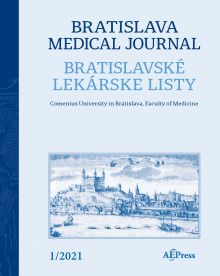Journal info
|
||||
Select Journal
Journals
Bratislava Medical Journal 2024 2023 2022 2021 2020 2019 2018 2017 2016 2015 2014 2013 2012 Ekologia - Ecology Endocrine Regulations General Physiology and Biophysics Neoplasma Acta Virologica Studia Psychologica Cardiology Letters Psychológia a patopsych. dieťaťa Kovove Materialy-Metallic Materials Slovenská hudba 2025Webshop Cart
Your Cart is currently empty.
Info: Your browser does not accept cookies. To put products into your cart and purchase them you need to enable cookies.
Bratislava Medical Journal Vol.119, No.4, p.234-239, 2018 |
||
| Title: Lithium prevents cell apoptosis through autophagy induction | ||
| Author: H. Kazemi, A. Noori-Zadeh, S. Darabi, F. Rajaei | ||
| Abstract: OBJECTIVE: Bone marrow stromal stem cells (BMSCs) are widely used as an available source for cell therapy, tissue engineering, and cellular differentiation-based techniques. Therefore, it is necessary to apply a simple method through which BMSCs can be protected from cell apoptosis under tough conditions of cell differentiation. Lithium treatment is one of the simple methods in this regard. METHODS: The isolated BMSCs were divided into three groups: (a) control, (b) serum deprivation and (c) LiCl. Cell proliferation and apoptosis and autophagy markers in the presence and absence of LiCl were evaluated. RESULTS: LiCl has shown to increase survival rate of BMSCs under serum deprivation conditions through autophagy induction (reduced P62 and increased LC3II) and apoptosis inhibition (expression of XIAP), so that the cell survival rate, after 12 hours, was 29 %, 59 %, 83 %, 74 %, 49 % for the groups, which received 0, 1, 5, 10, 20 millimolar of LiCl, respectively, as compared to the control group. CONCLUSION: LiCl leads to decreased apoptosis and increased survival rate through autophagy induction under serum deprivation conditions (Ref. 5, Ref. 37). |
||
| Keywords: lithium, bone marrow stromal cells, serum deprivation, autophagy, apoptosis | ||
| Published online: 09-Apr-2018 | ||
| Year: 2018, Volume: 119, Issue: 4 | Page From: 234, Page To: 239 | |
| doi:10.4149/BLL_2018_044 |
||
|
|
 download file download file |
|

